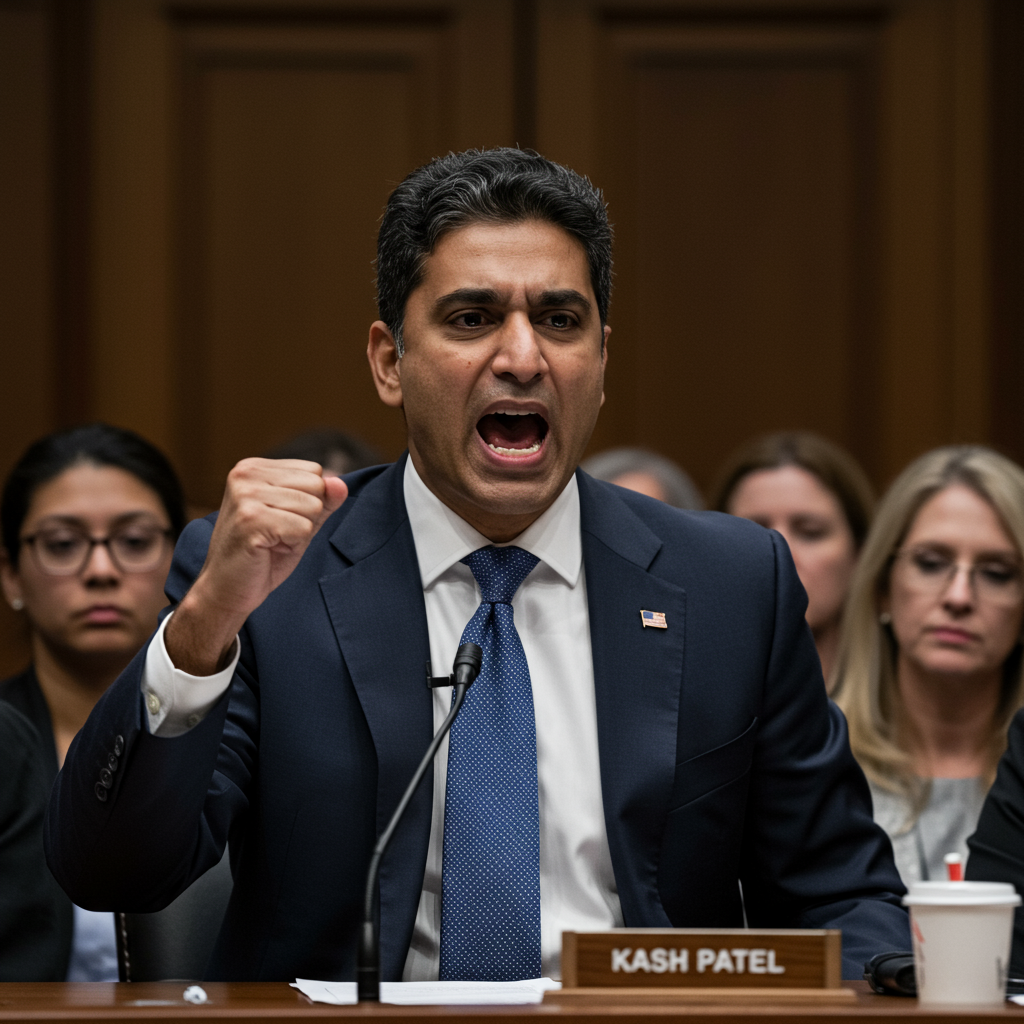FBI Director Kash Patel recently endured a tumultuous Senate Judiciary Committee hearing, facing sharp interrogations over the assassination of conservative activist Charlie Kirk and persistent questions about the Jeffrey Epstein case. The September 2025 oversight hearing on Capitol Hill erupted into heated exchanges, spotlighting the FBI’s leadership, transparency, and the deeply polarized political landscape. This critical examination saw Patel vigorously defend his actions and the bureau’s integrity amidst accusations of politicization and mismanagement.
The Charlie Kirk Assassination: A Rapid Response Amidst Controversy
The tragic assassination of conservative influencer Charlie Kirk on a Utah college campus dominated a significant portion of the hearing. Twenty-two-year-old Tyler Robinson, the alleged shooter, was apprehended swiftly, a success FBI Director Kash Patel attributed to his controversial decision to release enhanced photos and video of the suspect. This move, he asserted, went “against all law enforcement recommendations” but leveraged public assistance, leading to Robinson’s father recognizing him and urging his surrender within 36 hours of the Wednesday shooting.
Patel’s transparency, however, came under fire. Ranking Member Dick Durbin, a Democrat, lambasted Patel for initially announcing a suspect was in custody via social media, only to backtrack hours later. Durbin criticized these posts for sparking “mass confusion.” Patel, appearing on “Fox & Friends” before the hearing, stood by his communication style, claiming he was “telling the world what the FBI was doing as we were doing it.” He challenged critics to find a more transparent FBI Director.
Further complexities emerged with the alleged shooter’s Discord messages. Just two hours before his arrest, Robinson reportedly confessed to friends on the platform, stating, “Hey guys, I have bad news for you all … It was me at UVU yesterday. im sorry for all of this.” Director Patel confirmed the FBI is investigating “anyone and everyone involved in that Discord chat,” noting “a lot more” than 20 individuals linked to Robinson. This expanded probe indicates the possibility of additional accomplices. The investigation revealed Robinson’s alleged motive stemmed from Kirk’s “hatred,” expressing this in text messages to his transgender roommate. Surveillance footage, a rifle traced to Robinson, and distinct etchings on bullet rounds further solidify the case against him, with prosecutors seeking the death penalty.
Jeffrey Epstein Files: Unraveling the “Original Sin”
The hearing also saw FBI Director Kash Patel grilled on the handling of Jeffrey Epstein’s case, particularly regarding the release of related files. The Trump administration has faced pushback from supporters who demand more transparency, with right-wing influencers baselessly alleging authorities hid a “client list” of powerful individuals. However, both the Justice Department and FBI announced in July that no evidence of such a list had been found.
Patel squarely placed blame for the initial failings on former U.S. Attorney and Labor Secretary Alex Acosta. He labeled Acosta’s 2006 handling of Epstein’s plea deal, which involved a “very limited search warrant” and insufficient seizure of investigatory materials, as the “original sin.” Patel explicitly stated that “If I were the FBI director, then it wouldn’t have happened.” He firmly testified that Epstein was not an FBI informant, countering widespread claims, and assured Senator Chuck Grassley that all legally permissible records would be released. While Director Patel affirmed the current FBI possessed “no credible information” that Epstein trafficked young women to others, Senator John Kennedy cautioned that the issue “is not going to go away,” implying continued public scrutiny.
Explosive Clashes: Patel’s Verbal Battles on Capitol Hill
The hearing was defined by intense verbal confrontations between FBI Director Kash Patel and Democratic senators, highlighting deep political divides. A particularly fiery exchange unfolded with Sen. Adam Schiff regarding the Epstein investigation. Patel launched personal attacks, branding Schiff a “political buffoon,” “the biggest fraud to ever sit in the United States Senate,” and an “utter coward.” Schiff retaliated sharply, retorting that while one “can make an internet troll the FBI director,” they would “always be nothing more than an internet troll.”
Another shouting match erupted between Patel and Sen. Cory Booker. Booker accused Patel of making the country “weaker and less safe,” citing perceived failures in his leadership, including the unexplained ouster of several top FBI officials. Patel vehemently dismissed these claims as a “rant of false information.” The two continued to shout over each other until Committee Chair Chuck Grassley intervened. Republican Sen. Ted Cruz later quipped that the Senate Judiciary Committee had become the new venue for “theater,” a clear jab at the Democrats’ contentious questioning.
FBI Leadership Under Scrutiny: Politicization and Firings
Beyond specific investigations, Director Patel faced rigorous questioning about his leadership and accusations of politicizing the FBI. Sen. Dick Durbin criticized Patel as “arguably the most partisan FBI director ever,” alleging he had “inflicted untold damage” through an “unprecedented purge of FBI officials.” Concerns were raised about the appointment of Dan Bongino, a podcaster and former Secret Service agent, as Deputy Director, particularly regarding his past comments about the January 6th events.
Patel defiantly defended his tenure and that of his leadership team, highlighting “31 years of combined experience” and touting increased arrests for violent crime and illegal firearm seizures. He dismissed allegations of having an “enemies list” or terminating employees for political reasons, stating, “No one at the FBI is terminated for case assignments alone.” He asserted that under his command, the FBI “won’t be weaponized anymore” and would not inquire about agents’ voting histories. Regarding reports of polygraph tests being used as “loyalty tests,” Patel clarified that such tests are a long-standing FBI practice used to identify individuals leaking sensitive information. Despite the barrage of criticism, Director Patel concluded with a resolute statement: “I’m not going anywhere.”
Broader Implications: Political Violence and Social Media’s Influence
The hearing also touched upon the broader context of rising political violence and the role of social media in radicalization. Several senators, including Lindsey Graham, agreed with Director Patel that social media is “wildly out of control,” distinguishing its harmful potential from protected free speech. While some, like Sen. Eric Schmitt, attributed political violence to the left, Sen. Ted Cruz urged the FBI to prioritize conduct over speech. These discussions underscored the profound challenges facing law enforcement in an increasingly fractured society, highlighting the need for vigilance against all forms of extremism and incitement.
Frequently Asked Questions
What were the primary controversies FBI Director Kash Patel addressed during his Senate hearing?
FBI Director Kash Patel primarily addressed two major controversies during his September 2025 Senate Judiciary Committee hearing: his handling of the Charlie Kirk assassination investigation and the ongoing issues surrounding the Jeffrey Epstein files. He also faced intense scrutiny regarding accusations of politicizing the FBI, including allegations of firing career officials for perceived disloyalty and appointing controversial figures like Deputy Director Dan Bongino.
How did Director Patel defend his approach to the Charlie Kirk assassination investigation?
Director Patel defended his approach by highlighting the rapid apprehension of alleged shooter Tyler Robinson within 36 hours. He claimed this success stemmed from his controversial decision to release enhanced photos and video of the suspect, even against law enforcement recommendations, to solicit public help. Patel also asserted his commitment to transparency, stating he was more willing than previous directors to work with the media on high-profile cases, despite criticism for social media missteps.
What were the key accusations of politicization leveled against FBI Director Kash Patel?
Democratic senators, notably Dick Durbin and Cory Booker, accused Director Patel of politicizing the FBI. Accusations included an “unprecedented purge” of career FBI officials, making the agency “weaker and less safe,” and exhibiting extreme partisanship. Patel was also questioned about the appointment of Deputy Director Dan Bongino, whose past remarks on January 6th events were scrutinized. Patel vehemently denied these claims, asserting the FBI would not be “weaponized” under his leadership and that firings were based on professional conduct, not political loyalty.
Conclusion
FBI Director Kash Patel’s recent Senate Judiciary Committee hearing underscored the profound political divisions currently impacting high-stakes investigations and federal agency leadership. From the contentious details of the Charlie Kirk assassination and the lingering questions around Jeffrey Epstein to accusations of politicization within the FBI itself, the hearing offered a stark portrayal of Washington’s fractured landscape. Despite facing a barrage of criticism and engaging in heated verbal clashes, Patel remained defiant, asserting his commitment to transparency and denying any wrongdoing. This public spectacle not only highlighted persistent challenges for the FBI but also revealed the intense scrutiny and polarization that define contemporary American governance, leaving many questions about the bureau’s future direction and public trust unresolved.



